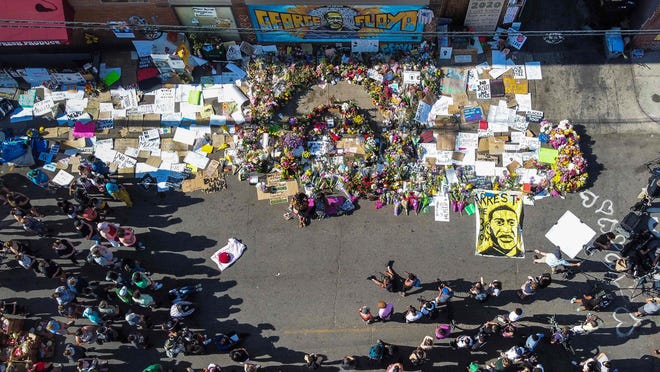A former Colorado police officer last week became the first to be convicted by a jury of failing to intervene after jurors found she did not step in when another officer choked a man and beat him with a gun during an arrest in 2021.
Francine Martinez will be sentenced in June after she was found guilty under a police accountability law passed in the wake of the 2020 murder of George Floyd, which made it illegal for officers not to step in when they witness unlawful physical force, according to a press release from office of the district attorney for Colorado’s 18th judicial district..
Martinez was fired after an internal investigation found she violated several department policies during the violent arrest of Black Army veteran Kyle Vinson, according to the Aurora Police Department. John Haubert, who was also charged in connection with the arrest, resigned amid the internal investigation.
State Rep. Leslie Herod said the 2020 law she helped craft will lead to a culture shift across the state’s law enforcement agencies.
“I believe that provisions around duty to intervene and duty to report with criminal consequences — which is important, there must be criminal consequences — will really start to weed out and show the face of law enforcement officers that are doing harm in our communities,” she said.
Colorado conviction sends a message, attorney says
Vinson’s attorney, Siddhartha Rathod said the verdict in Martinez’s case should send a message to law enforcement “that the era of the blue code of silence is over.”
“And the message should not only be to law enforcement, but it should be to prosecutors across the state of Colorado that these types of claims are important, because this is how we get change in our system,” Rathod said.
Martinez is the first officer to by convicted by a jury under the new law, but former Loveland, Colorado, police officer Daria Jalali pleaded guilty to failure to intervene and was sentenced to 45 days in jail last year after a fellow officer injured a 73-year-old woman who had dementia during an arrest.
Attorneys for Martinez and Haubert did not immediately respond to a request for comment from USA TODAY.
Several states created duty-to-intervene requirements in recent years, according to the National Conference of State Legislatures. Nearly two dozen of the country’s 100 largest police departments implemented similar policies since the racial justice protests following Floyd’s murder, said Howard Henderson, director of the Center for Justice Research at Texas Southern University.
“The challenge is whether or not officers have responded to those policies by intervening,” Henderson said. “That’s a number that we’ve been unable to track.”
Federal duty to intervene already exists; more training needed
Federal courts established law enforcement officers have a duty to intervene when they see others infringing upon someone’s constitutional rights nearly 50 years ago, Georgetown Law professor Christy E. Lopez previously told USA TODAY. Former Minneapolis officers J. Alexander Kueng and Tou Thao were convicted and sentenced in federal court last year for willfully failing to intervene while Derek Chauvin knelt on Floyd’s neck.
Even with new laws and policies in place, officers may still fail to intervene due to inadequate training on intervention strategies and the rigidly hierarchical workplace, said Lopez, former deputy chief in the Civil Rights Division at the Department of Justice.
“For years, the response we got is, ‘Oh, we already have a duty to intervene and officers know about that,'” she said. “The problem was not the lack of the duty.”
Henderson and Lopez, who previously trained Aurora police on intervention strategies, said more training on intervention is needed to change police culture. Herrod agreed.
“There’s no silver bullet to changing a culture that has been traditionally protect the blue at all cost,” she added
City settles, officers charged after violent arrest
Body camera footage of the July 2021 arrest released by the city shows Haubert pushed Vinson to the ground, pointed his gun at him and repeatedly told him to roll onto his stomach. Haubert hit Vinson multiple times with his gun, grabbed him by the throat and threatened to shoot him, the video shows.
No lawsuit was filed in the case, but the city paid $850,000 to settle the matter in September, spokesperson Ryan Luby said. Two months after Vinson’s arrest, a civil rights investigation sparked by the death of Elijah McClain found the Aurora Police Department has a pattern of racially biased policing and use of excessive force.
Haubert was charged with attempted first degree assault, causing serious bodily injury with a deadly weapon, second degree assault/strangulation, felony menacing, official oppression, official misconduct and a violent crime sentence enhancer. His trial is set to begin in November, according to the district attorney’s office.
Rathod said while his client’s physical injuries have healed in the two years since the beating, he’s still recovering emotionally.
“He didn’t do anything. He’s the one who followed the commands of the officers,” he said. “It makes no sense to get this sort of violent assault.”

Dig deeper
Contact Breaking News Reporter N’dea Yancey-Bragg at nyanceybra@gannett.com or follow her on Twitter @NdeaYanceyBragg


